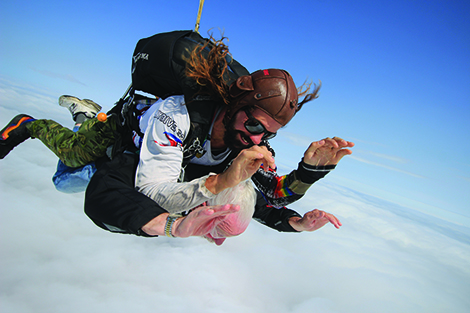A ‘scary, exhilarating’ dream come true
Well, that’s one way to make a dream come true.
Dennis Cobourn, 82, went skydiving thanks to the “Livin’ the Dream†program at Solstice Senior Living at Point Defiance, the Tacoma community where he lives. The program helps residents fill their bucket list at any age.
When Cobourn shared his lifelong ambition to skydive, the wheels (or is that wings?) were set in motion. And on Aug. 17, he took the plunge.
“It was scary, exciting and exhilarating. I’m so glad I did it,†Cobourn said after jumping out of a plane while strapped to a professional skydiver who guided him on the way down.
He was joined for the sky-high adventure at Skydive Kapowsin in Shelton by Solstice administrator Lisa Meinecke, who also counted skydiving as a personal item on her own bucket list.
“There was no chickening out for them. They were in all the way,†said Joelle Nyman, director of vibrant-life services at Solstice at Point Defiance. In Cobourn’s case, “age has never stopped him,†she added.
Cobourn, who loves rock and roll music and sports cars, is a longtime aviation buff. He graduated from Iowa State University with a degree in aerospace engineering. He went on to work on space launch vehicles for General Dynamics in San Diego and Boeing 737 and 747 aircrafts in Seattle. Later, he worked as a utilities engineer in Vancouver, Wash. and Bremerton.
For his skydiving experience, Cobourn did a tandem jump—attached back-to-front with a harness to a qualified instructor. Some pre-jump training on the ground covered the gear they’d be using, how they’d jump from the plane, and techniques for freefalling and landing.
In tandem jumps, the duo typically freefalls for a minute, reaching a speed of 120 miles per hour before opening the parachute at an altitude of about 5,000 feet. The rest of the descent takes four to six minutes, according to Skydive Kapowsin.
Cobourn is now in the company of other octogenarians and up who’ve skydived. The oldest tandem jumper on record, according to Guinness Book of World Records, is Al Blaschke of Texas, who was 103 for his leap in 2020—which wasn’t his first. He also jumped when he was 100. The previous recordholder was a 102-year-old woman, who did it in 2018.
The oldest solo jumper was 80-year-old Dilys Price of Wales, in 2018. She died in 2020.

